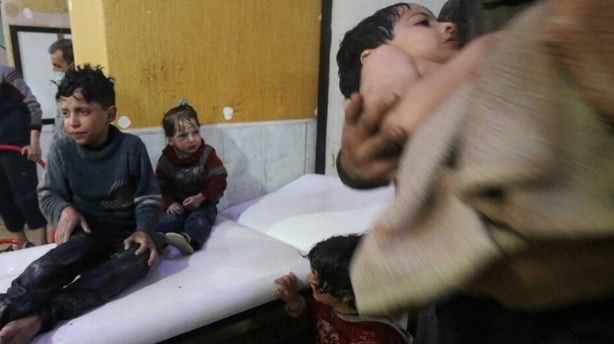The United States and its ally France criticised Syria's Bashar al-Assad at the United Nations today for allegedly using chemical weapons as the prospect of US-led military action that could lead to confrontation with Russia hung over the Middle East.
As chemical weapons experts arrived in Syria to investigate a suspected poison gas attack by government forces, international diplomacy was in high gear to head off an escalation, though accusations flew thick and fast between Washington and its allies, and Russia, Assad's main backer.
US President Donald Trump warned on Wednesday that missiles "will be coming" in response to the toxic gas assault on 7 April that killed dozens of people in Douma, a town near Damascus which had been held by rebels until this month.
We need your consent to load this rte-player contentWe use rte-player to manage extra content that can set cookies on your device and collect data about your activity. Please review their details and accept them to load the content.Manage Preferences
Russia said there is no evidence of a chemical attack in Douma and has warned the United States and its allies against carrying out any military strike.
While Mr Trump himself was silent on Syria today, giving no further clues on whether US military action was imminent, US Ambassador to the United Nations Nikki Haley said Washington estimated Mr Assad's forces had used chemical weapons at least 50 times during the seven-year-long Syrian conflict.
"Our president has not yet made a decision about possible action in Syria. But should the United States and our allies decide to act in Syria, it will be in defence of a principle on which we all agree," Ms Haley told the UN Security Council.
"All nations and all people will be harmed if we allow Assad to normalise the use of chemical weapons."
There was no word from Russian President Vladimir Putin himself, though his foreign minister, Sergei Lavrov, said Moscow was in contact with Washington to discuss an atmosphere which he described as alarming.
"God forbid anything adventurous will be done in Syria along the lines of the Libyan and Iraqi experience," Mr Lavrov told a news conference, referring to past western military interventions elsewhere in the region.
"Even non-significant incidents would lead to new waves of migrants to Europe and to other consequences, which neither we nor our European neighbours need," Mr Lavrov said.
Read More:
UK govt agrees on 'need to take action' over Syria attack
How the West might strike Syria
Key questions as tensions rise after Syria attack
Chemical weapons inspectors, how do they work?
Earlier, French President Emmanuel Macron spoke by phone with Mr Putin and expressed concern about a worsening situation.
Striking a conciliatory note, Mr Macron's office said: "The president of the republic called for dialogue with Russia to be maintained and stepped up to bring peace and stability back to Syria."
But this was balanced by a warning from the French ambassador to the United Nations, Francois Delattre, who told the Security Council that the Syrian government's decision to use chemical weapons again meant they had "reached a point of no return".
The world must provide a "robust, united and steadfast response", Mr Delattre said.
Never said when an attack on Syria would take place. Could be very soon or not so soon at all! In any event, the United States, under my Administration, has done a great job of ridding the region of ISIS. Where is our "Thank you America?"
— Donald J. Trump (@realDonaldTrump) April 12, 2018
Since 2015 France has carried out air strikes against the so-called Islamic State in Syria as part of allied forces linked to the US-led coalition, conducting about 5% of total coalition air missions.
Meanwhile, Britain's UN Ambassador Karen Pierce rejected a charge by a Russian defence ministry spokesman that Britain was involved in staging a fake chemical weapons attack in Douma.
"This is grotesque, it is a blatant lie, it is the worst piece of fake news we've yet seen from the Russian propaganda machine," Ms Pierce told reporters.

Russian Deputy Prime Minister Arkady Dvorkovich took an apparent swipe at Mr Trump's tweets. "We cannot depend on what someone on the other side of the ocean takes into his head in the morning. We cannot take such risks," he said at a forum.
Vassily Nebenzia, Moscow's UN ambassador, said he "cannot exclude" war between the United States and Russia. "The immediate priority is to avert the danger of war," he told reporters. "We hope there will be no point of no return."
A first team of experts from the global Organisation for the Prohibition of Chemical Weapons has arrived in Syria, UN Secretary-General Antonio Guterres said.
The investigators, who are only mandated to determine if chemical weapons were used and not who used them, are expected to start their investigations into the Douma incident tomorrow, the Netherlands-based agency said.
In Geneva today, UN war crimes investigators condemned the suspected use of chemical weapons in Douma and called for evidence to be preserved with a view to future prosecutions.

